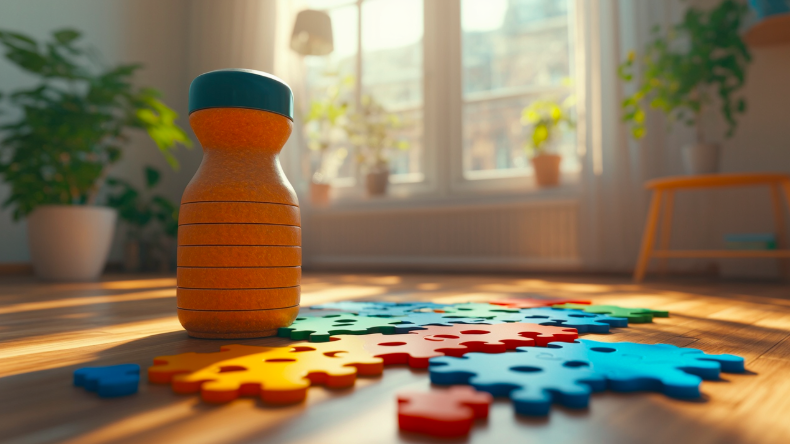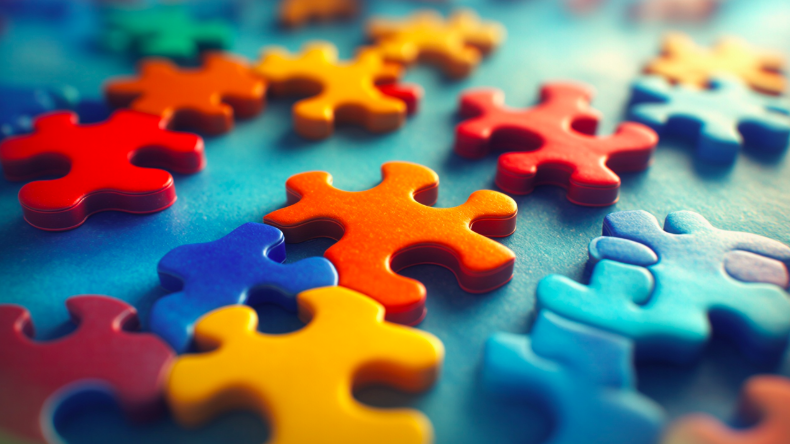Puzzle Therapy Applications For Mental Health & Focus
Explore puzzle therapy applications in reducing stress, anxiety, and improving focus, memory, and emotional control for all age groups.
Mar 30, 20253K Shares105.1K Views

What Is Puzzle Therapy?
Puzzle therapy is a method that uses structured puzzle-based activities to support brain health and emotional well-being. It involves tasks like jigsaw puzzles, crosswords, Sudoku, pattern recognition games, and logic challenges. These puzzles are not just games—they are tools used in therapy to improve thinking, focus, and emotional control.
How Puzzle Therapy Works
Puzzle therapy works by activating different areas of the brain. For example, jigsaw puzzles boost visual-spatial skills, memory, and concentration. Word and number puzzles help with language and problem-solving. These activities require focus, patience, and logical thinking, which helps the brain build stronger connections.
Therapists often guide the person through a series of puzzles that are chosen based on their needs. As the person works through each puzzle, they practice skills like attention, decision-making, and emotional control in a safe and calm environment.
Key Benefits of Puzzle Therapy
- Improves cognitive functionssuch as memory, logic, and attention
- Supports emotional balanceby reducing anxiety and stress
- Boosts self-esteemas patients solve problems and make progress
- Encourages engagementin both individual and group therapy sessions
- Promotes fine motor skillsthrough hands-on activities
These benefits make puzzle therapy useful for people of all ages—from children with learning difficulties to older adults with memory loss.
Why Puzzle Therapy Is Gaining Popularity
Puzzle therapy is growing in use because it is simple, low-cost, and non-invasive. It doesn’t require special machines or medication. It can be used alone or with other treatments.
In mental health, it helps reduce negative thoughts by shifting focus to structured activity. In education, it builds concentration, patience, and logical thinking. In rehabilitation, it helps people recovering from brain injuries, strokes, or trauma regain lost skills in a slow, safe, and measurable way.
Therapists, educators, and caregivers find it helpful because it is adaptable. Puzzles can be made easier or harder based on the person’s condition. They can also be personalized for different therapy goals.
Cognitive Benefits of Puzzle Therapy
Boosts Memory Function
Puzzle therapy helps improve both short-term and long-term memory. Activities like jigsaw puzzles and matching games require recalling shapes, colors, and placements. This repetition strengthens neural connections and supports memory retention. Regular puzzle-solving has been shown to delay memory loss in older adults and boost learning in younger individuals.
Improves Attention and Focus
Many puzzles demand full attention to complete. Crossword puzzles, Sudoku, and pattern-based games help train the brain to focus for longer periods. This improves sustained attention and reduces distractions. In therapy, these tasks are useful for people with ADHD, brain injuries, or difficulty concentrating.
Enhances Problem-Solving Skills
Puzzle therapy builds logical thinking and decision-making. Puzzles like mazes, logic grids, and brainteasers require planning and strategy. These activities teach how to analyze a situation, consider different options, and select the best path to a solution. This type of thinking transfers to everyday problem-solving.
Develops Critical Thinking
Critical thinking involves analyzing facts, identifying patterns, and making reasoned judgments. Puzzles support this by presenting challenges that have only one or a few correct answers. Games such as riddles, sequence puzzles, and complex logic tasks improve a person’s ability to think deeply and evaluate outcomes.
Encourages Cognitive Flexibility
Some puzzles require switching strategies when one path doesn’t work. This helps improve cognitive flexibility—the ability to adapt and change thinking as needed. It is especially helpful in recovery settings where brain function is being restored after stroke, trauma, or surgery.
Common Puzzles Used in Cognitive Therapy
- Jigsaw puzzles– for memory, coordination, and spatial reasoning
- Crossword puzzles– for language skills and recall
- Sudoku and number puzzles– for logic and sequence recognition
- Mazes and pathfinding games– for planning and spatial awareness
- Pattern and matching games– for attention and recognition speed
Puzzle Therapy for Mental Health Support
Reduces Stress and Promotes Relaxation
Puzzle activities help reduce stress by shifting focus away from worries. They engage the brain in a calm and structured task. This lowers heart rate and reduces muscle tension. Activities like jigsaw puzzles and coloring puzzles have been found to produce a meditative effect. This helps the body and mind relax, even during emotional distress.
Helps Manage Anxiety and Negative Thoughts
Puzzles can calm anxious thoughts by keeping the brain busy with a clear goal. Solving a puzzle step-by-step creates a sense of order and control. This is especially useful for people with anxiety disorders who struggle with racing thoughts. Completing even small tasks brings a sense of success, which boosts confidence and emotional balance.
Supports Therapy for Depression
Puzzle therapy can be helpful in managing mild to moderate depression. It gives the person something to focus on and encourages active thinking. Puzzles break the cycle of low motivation by offering short, rewarding challenges. Over time, this builds mental energy and improves mood. Therapists often use puzzles to reconnect people with daily activities.
Used in PTSD and Trauma Recovery
In trauma-focused care, puzzles help bring focus back to the present moment. They reduce emotional overload and give the brain something neutral to work on. This grounding effect is useful for people with post-traumatic stress disorder (PTSD). Puzzles are also used in group therapy sessions to help patients rebuild trust and communication.
Beneficial for ADHD and Attention Disorders
Puzzle therapy is helpful for individuals with ADHD. It provides structure and promotes attention control. Tasks like pattern matching, number puzzles, or word games train the brain to stay engaged. Puzzles can also reduce impulsive responses by encouraging slower, thoughtful action.
Types of Puzzles Used in Mental Health Therapy
- Jigsaw puzzles– calming and visual-focused
- Mazes– help with focus and sequencing
- Word and logic puzzles– support attention and thinking
- Color-based puzzles– reduce stress through sensory input
- Tactile puzzles– used in occupational and trauma therapy
Puzzle-Based Interventions in Elderly Care
Helps Prevent Cognitive Decline
Puzzle activities support brain health in older adults by keeping the mind active. Regular mental stimulation is linked to a lower risk of cognitive decline. Puzzles challenge memory, reasoning, and focus—skills that often weaken with age. Simple tasks like Sudoku, crosswords, and pattern games help maintain mental sharpness.
Supports Dementia and Alzheimer’s Care
Puzzle therapy is widely used in dementia care settings. It helps slow the progress of memory loss and improves mood. Matching games, picture puzzles, and large-piece jigsaws are commonly used. These puzzles are safe, easy to handle, and designed for different stages of memory impairment. They promote recognition, repetition, and gentle engagement with familiar images.
Encourages Daily Engagement
Many seniors face loneliness, low energy, and reduced motivation. Puzzles give them a reason to engage in daily routines. Group puzzle sessions help build social interaction and reduce feelings of isolation. Puzzles also offer a goal-oriented activity that brings satisfaction and joy without pressure.
Improves Fine Motor Skills and Coordination
Handling puzzle pieces helps seniors maintain hand-eye coordination and finger movement. These small actions support independence in everyday tasks such as eating, dressing, or writing. Therapists often include tactile puzzles in occupational therapy to maintain these physical skills.
Types of Puzzles Used in Elderly Care
- Large-piece jigsaw puzzles– for visual memory and coordination
- Word searches– support language and recall
- Matching and memory card games– aid in recognition and attention
- Simple logic puzzles– improve reasoning without stress
- Color and shape puzzles– stimulate the senses and visual-spatial skills
Puzzle Therapy for Children with Special Needs
Supports Children with Autism Spectrum Disorder (ASD)
Puzzle therapy is effective for children with autism. It helps improve focus, reduce repetitive behaviors, and encourage turn-taking. Picture puzzles and shape sorters are often used to teach visual recognition, matching, and sequencing. These activities also support communication and social interaction during guided sessions.
Helps Children with Learning Disabilities
Children with learning disabilities often struggle with memory, attention, and problem-solving. Puzzle therapy gives them a safe and engaging way to build these skills. Word puzzles, number games, and logical patterns help strengthen language and math understanding. These structured tasks allow children to learn through repetition and step-by-step problem-solving.
Aids Developmental Delays
For children with delays in speech, motor skills, or thinking, puzzles offer focused and hands-on learning. They support brain development through simple tasks like fitting pieces, matching colors, or following a sequence. Puzzle activities are often included in early intervention programs to promote cognitive and motor growth.
Provides Sensory Integration Benefits
Many children with special needs have sensory processing issues. Puzzle therapy offers sensory input in a calm and controlled way. Tactile puzzles with textures, colors, or sound elements help with touch, sight, and hearing. These tools are used in occupational therapy to help children adapt to different sensory experiences.
Promotes Structure and Predictability
Children with special needs benefit from routines and clear steps. Puzzles offer a structured format where progress is easy to track. Completing a puzzle gives a sense of order and achievement. This builds confidence and encourages learning through repetition.
Common Puzzles Used in Special Needs Therapy
- Shape sorters and block puzzles– for motor control and matching
- Picture and object puzzles– to improve recognition and memory
- Sound or textured puzzles– for sensory learning
- Number and alphabet puzzles– to support basic academic skills
- Sequencing puzzles– for step-by-step thinking and pattern awareness
❓ FAQs for Puzzle Therapy Applications
What is puzzle therapy and how does it work?
Puzzle therapy is a method that uses structured puzzles to support mental, emotional, and cognitive health. It works by engaging the brain in focused activities like matching, sequencing, and pattern recognition, which strengthen memory, logic, and attention over time.
Can puzzles improve mental health?
Yes, puzzles can improve mental health. They reduce stress, lower anxiety, and help manage depression by offering a calming, goal-oriented activity. Puzzles also boost confidence and promote a sense of achievement.
Are puzzles useful in treating dementia?
Puzzles are helpful in dementia care. They stimulate memory, support recognition, and encourage mental activity. Simple puzzles also provide comfort, reduce confusion, and maintain a connection with familiar images or words.
How does puzzle therapy help children with autism?
Puzzle therapy helps children with autism develop focus, visual skills, and problem-solving abilities. It also supports communication and routine learning. Sensory puzzles can calm overstimulation and help with emotional regulation.
What types of puzzles are used in therapy?
Therapists use puzzles like jigsaws, shape sorters, matching games, word searches, Sudoku, and tactile puzzles. The choice depends on the person's needs, age, and therapy goals.
Is puzzle therapy supported by research?
Yes, puzzle therapy is supported by research in psychology, occupational therapy, and neuroscience. Studies show it can enhance brain function, reduce cognitive decline, and support recovery after brain injuries.
Can puzzles reduce stress and anxiety?
Puzzles help reduce stress and anxiety by offering a calming and structured task. They redirect focus from negative thoughts, slow down racing thoughts, and support relaxation.
How often should puzzle therapy be practiced?
Puzzle therapy can be practiced daily or several times a week. Regular sessions, even just 20–30 minutes, can bring steady cognitive and emotional benefits over time.
Is puzzle therapy suitable for all age groups?
Yes, puzzle therapy is suitable for children, adults, and seniors. The type and difficulty of puzzles can be adjusted to match age, ability, and individual needs.
Do therapists use puzzles in clinical settings?
Many therapists use puzzles in clinical and educational settings. They are part of cognitive rehabilitation, mental health therapy, and special education programs due to their structured and flexible nature.
Latest Articles
Popular Articles
